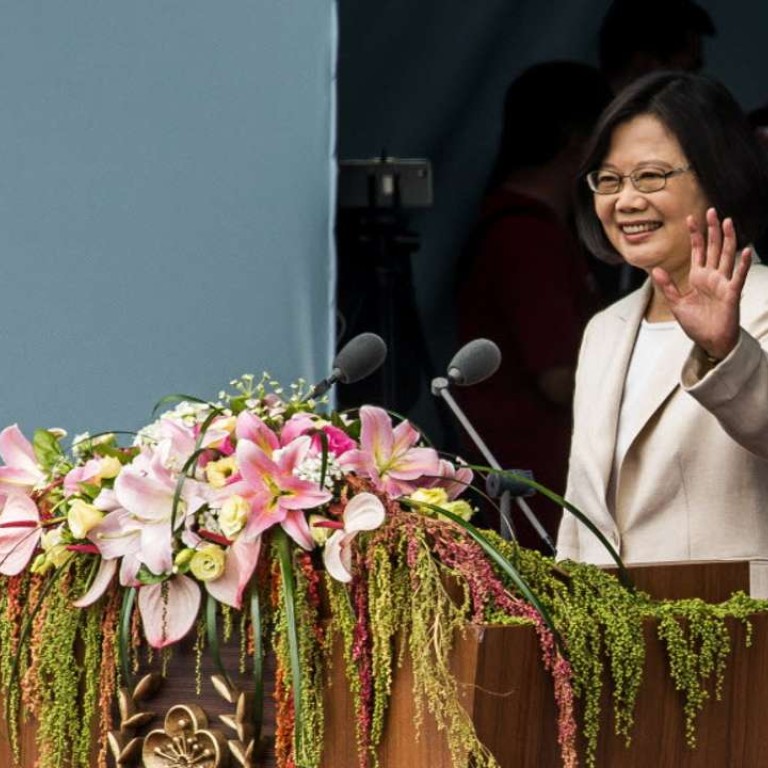
Beijing threatens to suspend talks with Taipei until Tsai Ing-wen acknowledges ‘1992 consensus’
Beijing has threatened to suspend regular talks with Taipei as it steps up pressure on Taiwan’s new government to acknowledge the “1992 consensus”.
“Only by confirming adherence to the common political foundation of the 1992 consensus that embodies the one-China principle can cross-strait affairs authorities continue regular communication,” Ma Xiaoguang, spokesman of the State Council’s Taiwan Affairs Office (TAO), said on Saturday. The warning came after the TAO on Friday called Tsai’s speech an “incomplete test answer”.
Beijing expresses dissatisfaction after Taiwan’s new President Tsai Ing-wen swaps ‘consensus’ for ‘historic fact’
Meanwhile, Beijing’s semi-official intermediary for discussing cross-strait relations, the Association for Relations Across the Taiwan Straits (ARATS), said that if Tsai wanted negotiations with its Taiwanese counterpart, the Straits Exchange Foundation (SEF) to continue, Taiwanese authorities needed to endorse the SEF to declare adherence to the 1992 consensus.
Beijing has repeatedly insisted that Taipei abide by the consensus if it is to continue interactions with the mainland.
In her inauguration speech, closely watched by Beijing and political observers around the world, Tsai, sworn in as the island’s first female president on Friday, avoided mentioning the word “consensus”.
Instead, she said she respected the “historic fact” that a meeting took place in 1992, during which Taiwan and the mainland sought common ground and tried to set aside differences.
The consensus refers to the understanding reached between representatives of Beijing and Taipei that Taiwan and the mainland belong to a single sovereign nation. It leaves open to interpretation which side is the legitimate government.
All eyes on Tsai as she sets tone for relations with Beijing
Since 2008, the Beijing-friendly Kuomintang government under former president Ma Ying-jeou had supported the consensus. Tsai’s independence-leaning Democratic Progressive Party, has always refused to endorse it.
Ma Xiaoguang said that cross-strait affairs authorities had maintained active interactions for more than two years after establishing a communication channel based on the consensus in 2014. He was referring to a meeting in Nanjing in which officials agreed to set up a cross-strait hotline between the Mainland Affairs Council in Taipei and the TAO to facilitate the “proper handling of many sensitive issues”.
He said this paved the way for the sides to contact each other in a timely fashion, avoid misjudgments, keep disagreements under control, and it was also conducive to enhancing mutual trust.
Taiwan’s Mainland Affairs Council, however, said Tsai had already shown maximum flexibility and good will on cross-strait ties in her inaugural address. It said it would continue to communicate with its mainland counterpart to maintain the bilateral channel.
Most Taiwan scholars and politicians said Tsai’s speech was full of good will, given that she not only pledged to abide by the constitution of the Republic of China – Taiwan’s official title – which contains the one-China concept, but also the Act Governing Relations Between People of the Taiwan Area and the Mainland Area. The act states how Taiwan will handle relations with the mainland before reunification.
The world watches as Taiwan’s new President Tsai Ing-wen takes office
Douglas Paal, former head of the American Institute in Taipei, which represents US interests in the absence of formal diplomatic ties, said on Friday he found Tsai’s speech “rather successful”.
But Xinhua said on Saturday that Beijing wanted her to clearly state she adheres to the consensus – rather than be “ambiguous and evasive”.
It referred to what it said were the inconsistent words and deeds of former DPP president Chen Shui-bian, saying it was important for Tsai to “embrace the political foundation that the two sides of the strait belong to one China”.
Analysts said harsh actions could backfire. “If the mainland continues to snub Tsai, what will the pro-independence camp here think, and if the mainland suspends cross-strait interactions, what will the DPP think?” asked Julian Kuo, a former DPP legislator and now a professor at Chinese Culture University in Taipei.

